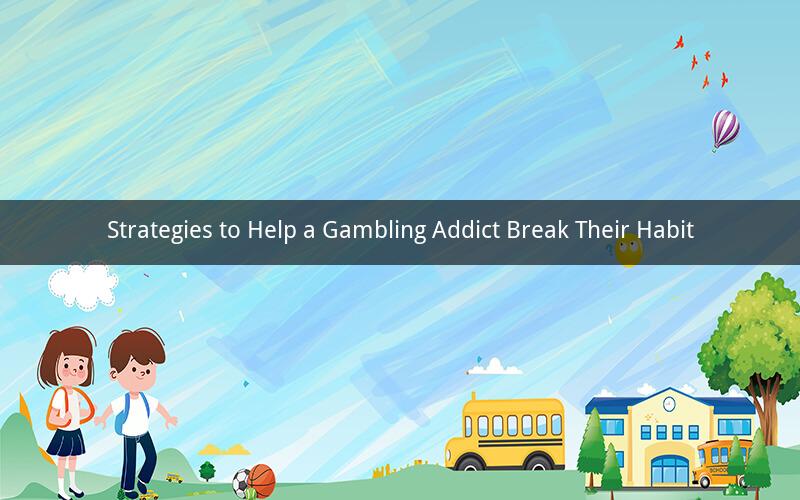
Introduction:
Gambling addiction is a serious issue that can have devastating effects on individuals and their families. It is crucial to understand the challenges faced by gambling addicts and the importance of providing support and guidance to help them overcome their addiction. This article explores various strategies to help a gambling addict stop their harmful behavior.
1. Recognize the signs of gambling addiction:
Identifying the signs of gambling addiction is the first step in helping someone overcome their problem. Common signs include hiding gambling activities, borrowing money, lying about gambling habits, and neglecting responsibilities. Recognizing these signs can help you take appropriate action to support the addict.
2. Encourage open communication:
Open and honest communication is essential in helping a gambling addict. Encourage them to express their feelings and concerns without judgment or criticism. By fostering a supportive environment, you can help them feel more comfortable sharing their struggles and seeking help.
3. Encourage professional help:
Seeking professional help is crucial for a gambling addict. Therapists, counselors, and addiction specialists can provide personalized support and guidance. Encourage the addict to attend therapy sessions or support groups, such as Gamblers Anonymous, to connect with others who understand their struggles.
4. Set boundaries and consequences:
Establishing clear boundaries and consequences can help hold a gambling addict accountable for their actions. These boundaries may include restricting access to gambling venues, limiting financial resources, and enforcing strict rules regarding responsible gambling. Consequences should be reasonable and consistent to promote accountability.
5. Support financial recovery:
Gambling addiction often leads to financial difficulties. Help the addict develop a budget and find ways to manage their finances responsibly. Consider offering financial assistance or connecting them with organizations that provide financial counseling and support.
6. Encourage alternative activities:
Encourage the gambling addict to engage in healthy and productive activities that can replace their gambling habits. These activities may include hobbies, exercise, or joining social clubs. Providing them with alternatives can help reduce the urge to gamble and promote a healthier lifestyle.
7. Provide emotional support:
Emotional support is crucial for a gambling addict's recovery journey. Offer empathy, understanding, and patience as they navigate the challenges of overcoming their addiction. Celebrate their successes and encourage them to seek support from loved ones when they face setbacks.
8. Educate yourself about gambling addiction:
Understanding the nature of gambling addiction can help you better support the addict. Learn about the psychological, social, and environmental factors that contribute to gambling addiction. This knowledge can enable you to offer more informed and effective support.
9. Be patient and persistent:
Recovery from gambling addiction is a long and challenging process. Be patient and persistent in your support, even when progress seems slow. Encourage the addict to maintain their commitment to recovery and celebrate small victories along the way.
10. Support aftercare:
Aftercare is an essential part of the recovery process. Encourage the addict to continue attending therapy sessions, support groups, and other forms of support after initial treatment. Aftercare can help them maintain their sobriety and prevent relapse.
Questions and Answers:
1. What are the most effective treatments for gambling addiction?
The most effective treatments for gambling addiction often involve a combination of therapy, support groups, and financial counseling. Therapy, such as cognitive-behavioral therapy (CBT), can help the addict identify and change negative thought patterns and behaviors. Support groups, like Gamblers Anonymous, provide a community of individuals who understand the challenges of addiction. Financial counseling can help the addict manage their finances and reduce the risk of relapse.
2. How can I help a loved one who is struggling with gambling addiction?
You can help a loved one struggling with gambling addiction by offering emotional support, encouraging them to seek professional help, setting boundaries and consequences, and supporting their financial recovery. Educating yourself about gambling addiction can also help you provide more informed and effective support.
3. Can a gambling addict recover completely?
Yes, a gambling addict can recover completely with proper treatment and support. Recovery is a long-term process that requires dedication, commitment, and patience. With the right resources and support, many individuals can overcome their addiction and lead a fulfilling life.
4. How can I help my child who is struggling with gambling addiction?
If your child is struggling with gambling addiction, it's essential to approach the situation with empathy and support. Encourage them to seek professional help, such as therapy or counseling. Establish open communication and provide a safe space for them to express their feelings. Educate yourself about gambling addiction to better understand and support your child's recovery journey.
5. What can I do if my loved one is in denial about their gambling addiction?
If your loved one is in denial about their gambling addiction, it can be challenging to help them. Focus on expressing your concerns without judgment or criticism. Offer support and encourage them to seek professional help. Remember that recovery is a personal journey, and your loved one must be ready to accept and embrace the change.